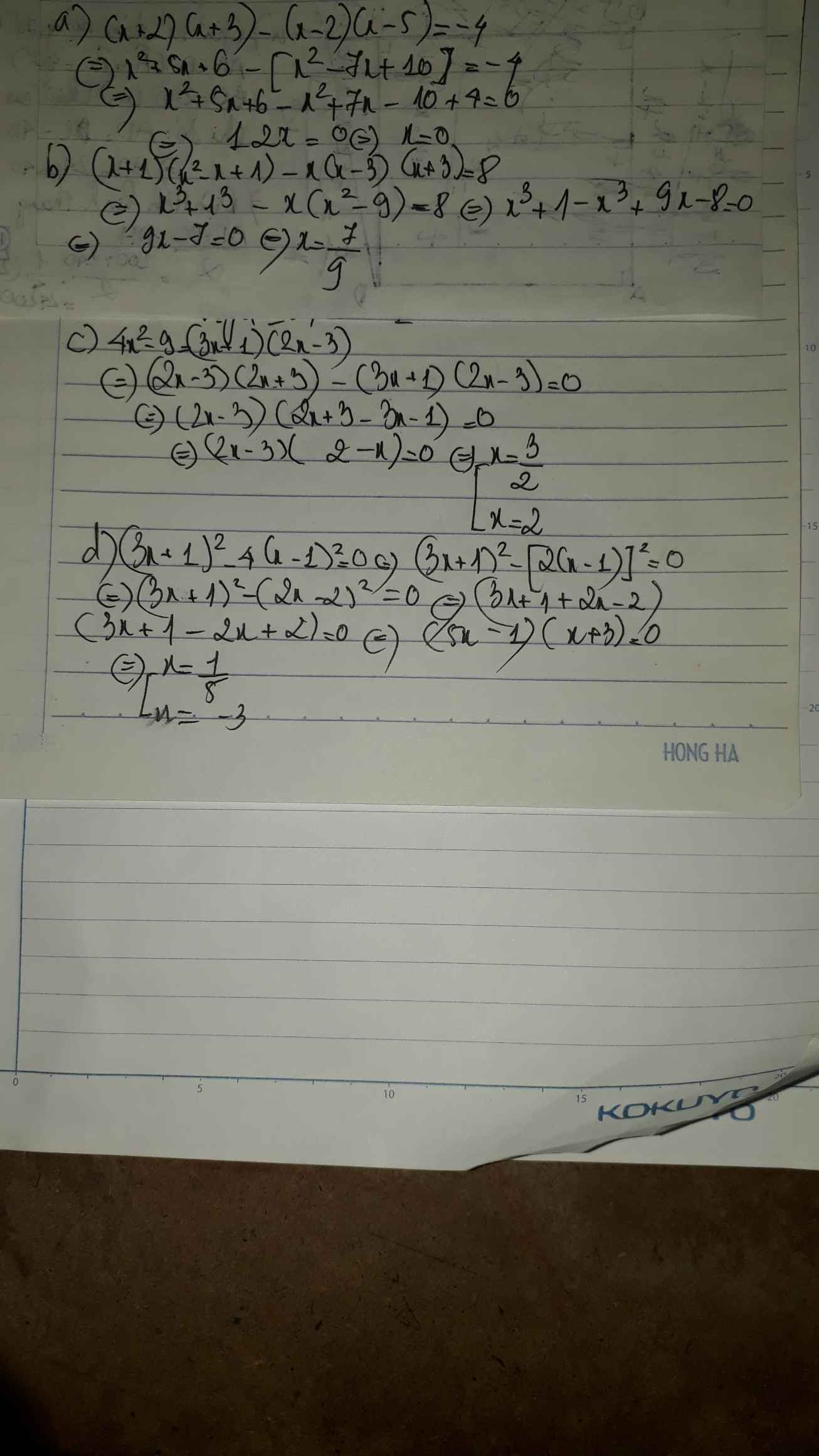4x2 - 9 +3(2 x-3)= 0
Hãy nhập câu hỏi của bạn vào đây, nếu là tài khoản VIP, bạn sẽ được ưu tiên trả lời.


a: (x^2+9)(9x^2-1)=0
=>9x^2-1=0
=>x^2=1/9
=>x=1/3 hoặc x=-1/3
b: (4x^2-9)(2^(x-1)-1)=0
=>4x^2-9=0 hoặc 2^(x-1)-1=0
=>x^2=9/4 hoặc x-1=0
=>x=1;x=3/2;x=-3/2
c: (3x+2)(9-x^2)=0
=>(3x+2)(3-x)(3+x)=0
=>\(\left[{}\begin{matrix}3x+2=0\\3-x=0\\3+x=0\end{matrix}\right.\Leftrightarrow x\in\left\{-\dfrac{2}{3};3;-3\right\}\)
d: (3x+3)^2(4x-4^2)=0
=>3x+3=0 hoặc 4x-16=0
=>x=4 hoặc x=-1
e: \(2^{\left(x-5\right)\left(x+2\right)}=1\)
=>(x-5)(x+2)=0
=>x-5=0 hoặc x+2=0
=>x=5 hoặc x=-2

( 2 x – 3 ) 2 – 4 x 2 + 9 = 0 ⇔ ( 2 x – 3 ) 2 – ( 4 x 2 – 9 ) = 0 ⇔ ( 2 x – 3 ) 2 – ( ( 2 x ) 2 – 3 2 ) = 0 ⇔ ( 2 x – 3 ) 2 – ( 2 x – 3 ) ( 2 x + 3 ) = 0
ó (2x – 3)(2x – 3 – 2x – 3) = 0
ó (2x – 3)(-6) = 0
ó 2x – 3 = 0
ó x = 3 2
Đáp án cần chọn là: C

\(a,\Leftrightarrow\left(2x-3\right)\left(x+2\right)=0\Leftrightarrow\left[{}\begin{matrix}x=\dfrac{3}{2}\\x=-2\end{matrix}\right.\\ b,\Leftrightarrow x^3-27-x^3+4x=1\\ \Leftrightarrow4x=28\Leftrightarrow x=7\\ c,\Leftrightarrow4x^2-4x-8=0\\ \Leftrightarrow x^2-x-2=0\\ \Leftrightarrow\left(x-2\right)\left(x+1\right)=0\Leftrightarrow\left[{}\begin{matrix}x=2\\x=-1\end{matrix}\right.\\ d,\Leftrightarrow2x^2+6x+x+3=0\\ \Leftrightarrow\left(x+3\right)\left(2x+1\right)=0\Leftrightarrow\left[{}\begin{matrix}x=-3\\x=-\dfrac{1}{2}\end{matrix}\right.\)

e: ta có: \(4x^2+4x-6=2\)
\(\Leftrightarrow4x^2+4x-8=0\)
\(\Leftrightarrow\left(x+2\right)\left(x-1\right)=0\)
\(\Leftrightarrow\left[{}\begin{matrix}x=-2\\x=1\end{matrix}\right.\)
f: Ta có: \(2x^2+7x+3=0\)
\(\Leftrightarrow\left(x+3\right)\left(2x+1\right)=0\)
\(\Leftrightarrow\left[{}\begin{matrix}x=-3\\x=-\dfrac{1}{2}\end{matrix}\right.\)

a: Ta có: \(\left(x+2\right)\left(x+3\right)-\left(x-2\right)\left(x-5\right)=-4\)
\(\Leftrightarrow x^2+5x+6-x^2+7x-10=-4\)
\(\Leftrightarrow12x=0\)
hay x=0
b: Ta có: \(\left(x+1\right)\left(x^2-x+1\right)-x\left(x-3\right)\left(x+3\right)=8\)
\(\Leftrightarrow x^3+1-x^3+9x=8\)
\(\Leftrightarrow9x=7\)
hay \(x=\dfrac{7}{9}\)
c: Ta có: \(4x^2-9=\left(3x+1\right)\left(2x-3\right)\)
\(\Leftrightarrow\left(3x+1\right)\left(2x-3\right)-\left(2x-3\right)\left(2x+3\right)=0\)
\(\Leftrightarrow\left(2x-3\right)\left(3x+1-2x-3\right)=0\)
\(\Leftrightarrow\left(2x-3\right)\left(x-2\right)=0\)
\(\Leftrightarrow\left[{}\begin{matrix}x=\dfrac{3}{2}\\x=2\end{matrix}\right.\)

g) \(4x^2-25-\left(2x-5\right)\left(2x+7\right)=0\)
\(\Rightarrow\left(2x-5\right)\left(2x+5\right)-\left(2x-5\right)\left(2x+7\right)=0\)
\(\Rightarrow\left(2x-5\right)\left(2x+5-2x-7\right)=0\)
\(\Rightarrow-2\left(2x-5\right)=0\Rightarrow x=\dfrac{5}{2}\)
i) \(x^3+27+\left(x+3\right)\left(x-9\right)=0\)
\(\Rightarrow\left(x+3\right)\left(x^2-3x+9\right)+\left(x+3\right)\left(x-9\right)=0\)
\(\Rightarrow\left(x+3\right)\left(x^2-3x+9+x-9\right)=0\)
\(\Rightarrow\left(x+3\right)\left(x^2-2x\right)=0\Rightarrow x\left(x+3\right)\left(x-2\right)=0\)
\(\Rightarrow\left[{}\begin{matrix}x=0\\x=-3\\x=2\end{matrix}\right.\)

a) \(7x\left(2x-3\right)-\left(4x^2-9\right)=0\Rightarrow7x\left(2x-3\right)-\left(2x-3\right)\left(2x+3\right)=0\Rightarrow\left(2x-3\right)\left(7x-2x+3\right)=0\Rightarrow\left[{}\begin{matrix}2x-3=0\\5x+3=0\end{matrix}\right.\Rightarrow\left[{}\begin{matrix}x=\dfrac{3}{2}\\x=-\dfrac{3}{5}\end{matrix}\right.\)
b) \(\left(2x-7\right).\left(x-2\right)\left(x^2-4\right)=0\Rightarrow\left(2x-7\right)\left(x-2\right)^2\left(x+2\right)=0\Rightarrow\left[{}\begin{matrix}2x-7=0\\\left(x-2\right)^2=0\\x+2=0\end{matrix}\right.\Rightarrow\left[{}\begin{matrix}x=\dfrac{7}{2}\\x=2\\x=-2\end{matrix}\right.\)
c)\(\left(9x^2-25\right)-\left(6x-10\right)=0\Rightarrow\left(3x-5\right)\left(3x+5\right)-2\left(3x-5\right)=0\Rightarrow\left(3x-5\right)\left(3x+5-2\right)=0\Rightarrow\left[{}\begin{matrix}3x-5=0\\3x+3=0\end{matrix}\right.\Rightarrow\left[{}\begin{matrix}x=\dfrac{5}{3}\\x=1\end{matrix}\right.\)
a: Ta có: \(7x\left(2x-3\right)-\left(4x^2-9\right)=0\)
\(\Leftrightarrow7x\left(2x-3\right)-\left(2x-3\right)\left(2x+3\right)=0\)
\(\Leftrightarrow\left(2x-3\right)\left(5x-3\right)=0\)
\(\Leftrightarrow\left[{}\begin{matrix}x=\dfrac{3}{2}\\x=\dfrac{3}{5}\end{matrix}\right.\)
b: Ta có: \(\left(2x-7\right)\left(x-2\right)\left(x^2-4\right)=0\)
\(\Leftrightarrow\left(2x-7\right)\left(x-2\right)^2\cdot\left(x+2\right)=0\)
\(\Leftrightarrow\left[{}\begin{matrix}x=\dfrac{7}{2}\\x=2\\x=-2\end{matrix}\right.\)
c: Ta có: \(\left(9x^2-25\right)-\left(6x-10\right)=0\)
\(\Leftrightarrow\left(3x-5\right)\left(3x+5-2\right)=0\)
\(\Leftrightarrow\left(3x-5\right)\left(3x+3\right)=0\)
\(\Leftrightarrow\left[{}\begin{matrix}x=\dfrac{5}{3}\\x=-1\end{matrix}\right.\)


\(4x^2-9+3\left(x-3\right)=0\)
\(\Leftrightarrow4x^2-9+3x-9=0\)
\(\Leftrightarrow4x^2+3x=0\)
\(\Leftrightarrow x\left(4x+3\right)=0\)
\(\Leftrightarrow\orbr{\begin{cases}x=0\\4x+3=0\end{cases}}\)
\(\Leftrightarrow\orbr{\begin{cases}x=0\\x=-\frac{3}{4}\end{cases}}\)
Vậy tập nghiệm của phương trình là \(S=\left\{0;-\frac{3}{4}\right\}\)